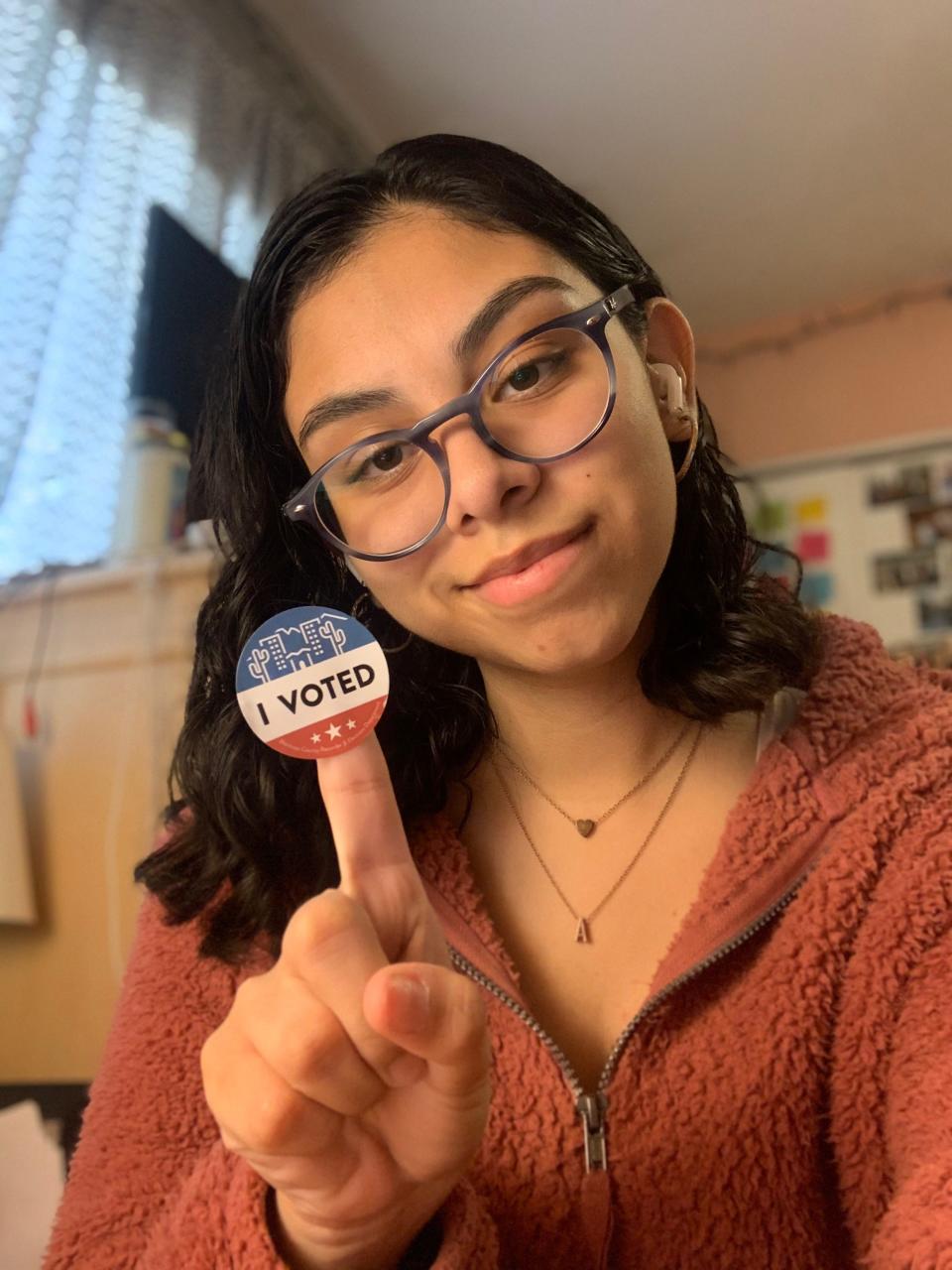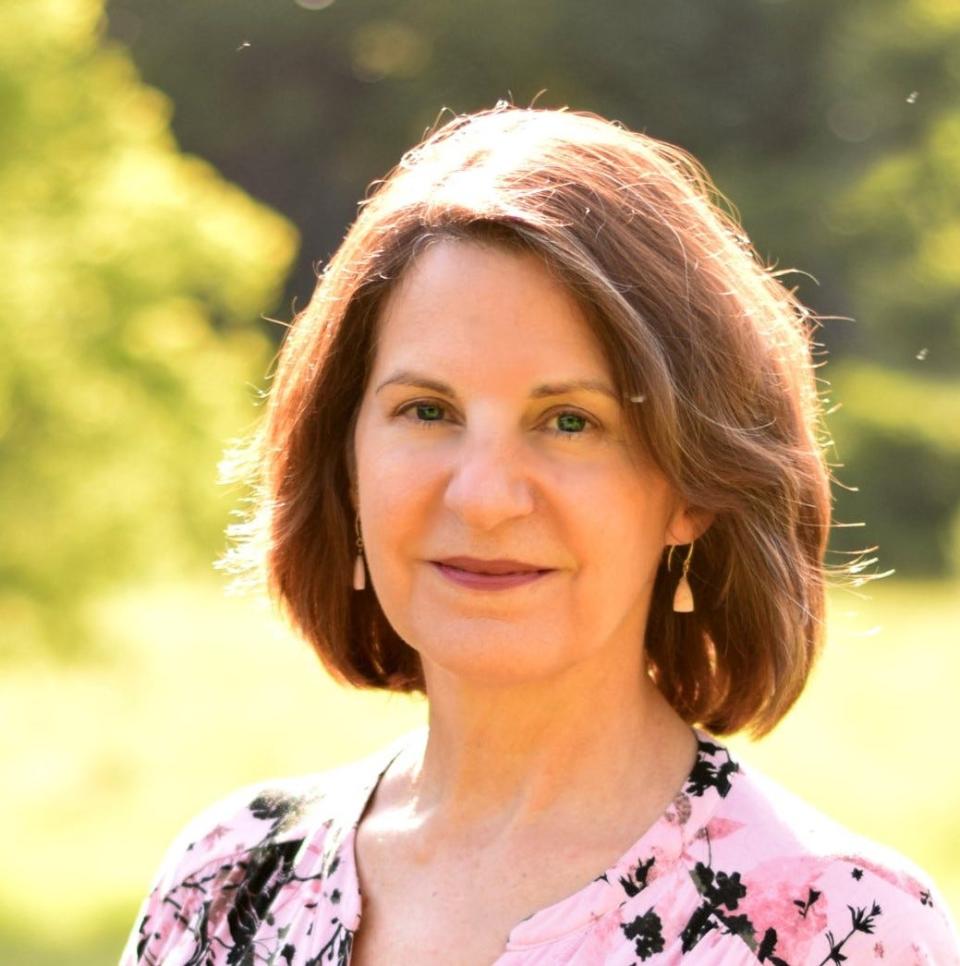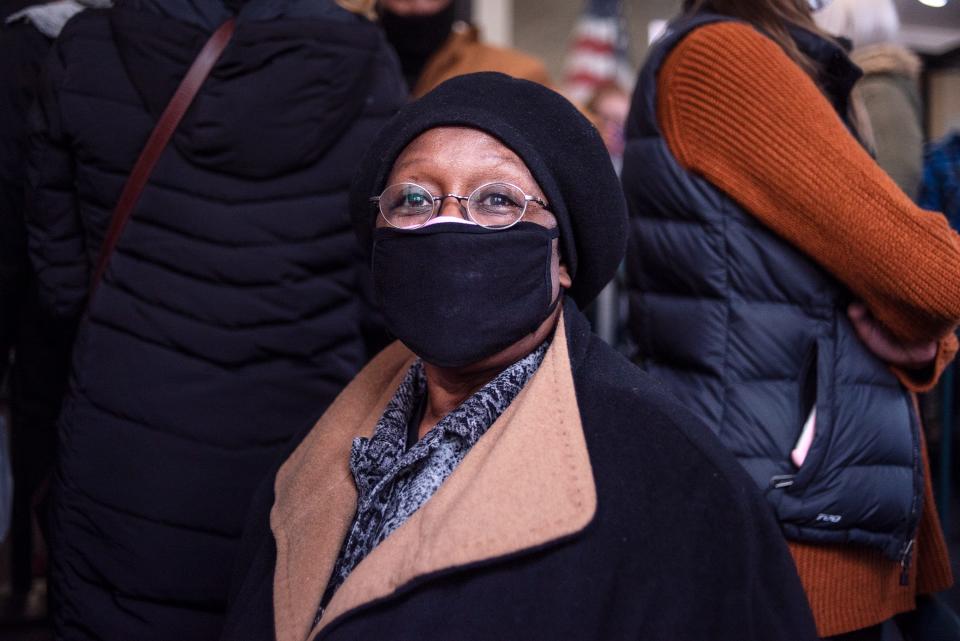'Hopefully it will calm down': The election is over. Now a stressed nation looks for normalcy under Joe Biden
- Oops!Something went wrong.Please try again later.
WASHINGTON — Three weeks before the election, Patrick Wall had enough.
He deleted the Facebook app off his phone and turned off Instagram notifications, hoping to shield himself from the latest viral political meme and temptation to engage in another social media fight.
"It was getting to be too much, too often," said Wall, 39, a construction company owner from St. Augustine, Florida, who voted for President-elect Joe Biden. "It was watching people get into stupid arguments about things they were ill-informed on and it was me getting into arguments with people whose minds aren't going to change."
Biden's victory marked the end of the most bitterly fought presidential elections in recent history, one that divided Americans and had both sides arguing the fate of the nation, even democracy itself, was at stake. A record 145 million people voted, and the total is expected to rise to 150 million after all absentee ballots are counted.
For the past year, friends argued with friends while others simply stopped talking to each other. Family members with opposing views tuned out their relatives. Consumed with the daily drama, both sides lived in separate social media and television bubbles that steered dramatically different outlooks on the race.
More: Joe Biden defeats President Donald Trump to become 46th president of the United States
But the stress did not vanish Nov. 3. It stretched across four days as results trickled in from a handful of key states. As Trump leveled baseless claims about voter fraud, bleary-eyed Americans watched frenzied television anchors make sense of minor updates, enduring political whiplash as Biden lurched toward the 270 electoral majority.
He finally crossed the threshold when Pennsylvania, and its 20 electoral votes, was called for him Saturday morning – about 89 hours after polls closed on Election Day.
In interviews with voters in six battleground states conducted by the USA TODAY Network before the election, Americans said they felt stressed by the weight of the election, anxious about their candidate's prospects and the uncertainty, disgusted at the other side, angry at the political discourse, and even scared about the violence they feared might play out after its conclusion.
"I'm just ready for it to not dominate every single day of everyone's life," Wall said, but added the tension isn't likely to end soon. "There's probably still going to be a lot of arguing and BS and hopefully at some point it will calm down."
Pandemic, recession put country on edge
Adding to anxieties, the election collided with a global pandemic that has killed more than 227,000 Americans, drove the U.S. economy into a recession and even sickened a president who repeatedly sought to downplay its grip on America.
The country was rocked by nationwide protests over police conduct and the death of Black Americans at their hands, while the death of Supreme Court Justice Ruth Bader Ginsburg jolted a political fight over the future of the high court just one month before Election Day. Democratic voters fumed that President Donald Trump questioned the integrity of the voting process and suggested he may not commit to accepting the election results. Trump supporters accused the media of deliberately not reporting on allegations about the businesses dealing of Biden's son, Hunter Biden.
But for as much as the events of 2020 have cleaved the country and created a powder keg moment, experts say the stress it triggered appears to be a unifying experience for most Americans, regardless of party.
More than two-thirds of adults – 68% – said the 2020 presidential election was a significant source of stress in their life, a marked jump from the 52% who said the same of the 2016 election four years ago, a survey by the Harris Poll on behalf of the American Psychological Association found last month.
More: Joe Biden timeline: From Scranton, Pennsylvania, to the White House
Vaile Wright, senior director of health care innovation at the APA, said part of the stress is being driven by the unprecedented level of uncertainty looming over the country and "an unbelievable level of fatigue."
The fatigue, she said, is directly related to the pandemic, which has confined millions of Americans to their homes and lingered for months beyond what anyone anticipated.
"There's just no shortage of stressors right now and they're all big, national level ones that leadership really has a massive influence on," she said.
3 out of 5 Americans overwhelmed
The APA survey found that 60% of respondents said the sheer number of issues facing America is what overwhelmed them the most, while one in five adults said their mental health is worse than it was at this time last year.
"People are not coping as well as they have been in the past. They're reporting higher levels of disrupted eating, disrupted sleep, that they're not getting as much support as they say they need," Wright said. "What it looks like to me is that people's coping skills are falling short."
Charles Drew, a fire chief in Southport, North Carolina, who voted for Trump, said he feels "a little bit of an uneasiness and a little nervousness because I think there's going to continue to be a divide in our country."
Drew, 46, said supporters defaced yard signs in his small town, near the Atlantic Coast close to Wilmington, N.C.
"It just seems like it's taken a twist in the last four years that it is more volatile or violent," he said, acknowledging Trump's rhetoric might have contributed to the shift. "People are getting, seems like, more hateful. It just seems like there's a shift or something in the country compared to what it has been in the past."
He said he breathes a "sigh of relief" when thinking about all the end of political ads and the piles of mailers in his mailbox each day. But he worried about the toll the election has taken on the nation and whether a feeling of violence among some voters replaced what used to be passion.
"I hate to say that," he said. "But I've seen that from both sides of the spectrum. And that concerns me as far as the direction our nation is heading in."
Some Americans feel more pressure
While no one has been immune the levels of stress, Wright said some groups seem to be disproportionately affected by recent events.
Individuals with chronic health conditions, members of communities of color, parents of children under the age of 18 and younger adults are among those who reported the highest levels of stress, she said.
Sherly Langer, 55, an accountant from St. Charles, Minnesota, who voted for Trump and worked the polls, said this was the closest she's ever followed an election. She called Americans "extremely divisive this time."
"It has been hard to talk to (people) because I think that a lot of people aren't open-minded," Langer said. "We've all kind of drawn our line in the sand and this is who we're going for. I have a sister who is extremely liberal, and we can't even talk about politics."
More: Kamala Harris breaks glass ceiling as first female vice president, first woman VP of color
A week before the election, Langer self-quarantined in her rural home in southeast Minnesota after being exposed to a niece in college who tested positive for COVID-19.
As the mother of a seventh-grade daughter curious about the election, Langer explained the mudslinging between Trump and Biden by telling her to listen to both sides and keep an opening mind.
Her daughter, who Langer's family adopted from Mexico, drew a line graph that depicted which candidate interrupted more during the first presidential debate in Ohio.
"She came away with the same thing that I did. If I was an undecided voter, I didn't learn anything at that first debate," Langer said. Days before the election, Langer jokingly predicted "peaceful protests" regardless who won. "I don't think it's going to be peaceful, but I have the luxury of living in the middle of a cornfield."

Alyssa Kihoi, 20, of Phoenix, Arizona, said she lost a number of friends and some sorority sisters for voicing her political opinion.
"It's unfortunate, but that's kind of where we're at right now in the world," said Kihoi, a member of Arizona State University's College Republicans. "I lost friends that I was friends with for years, people I grew up with."
As a first time voter who cast her ballot for Trump, Kihoi said she only became heavily invested in the election over the last six months when the coronavirus crisis unfolded.
"On the local level it's been tough, just seeing everyday COVID numbers and just constant negativity from the media on both ends, right wing and left wing," she said. "Some days are rougher than others. But at the end of the day I think we're all Americans. So whatever it happens, we're all in this together, for sure."
'A good news story' amid the chaos
While this year's election may have left some voters addled and anxious, one bright spot is that it has shattered early voting records and brought a surge of voters who did not cast a ballot four years ago. Americans endured hours waiting in lines despite the threat of the coronavirus while millions requested absentee ballots in the months and weeks before Election Day.
"It's a good news story," McDonald said. "If there was fatigue, it's probably among the elite because people want have their voices heard. They want their say in the direction of the country."

Abril Valenzula, an 18-year-old Arizona resident who voted for the first time this year, said the feeling she had most throughout the election was fear.
"I think it's mainly because there's a lot on the line for this election, and I know that whatever outcome comes out of it there will be some risk, there will be some changes," she said a few days before Election Day. "And I think that has been overwhelming, having that uncertainty present during this election cycle."
Though the election drew more engagement than any in recent memory, some voters never settled with either Biden or Trump.
Pat Browning, 61, of Saline, Michigan did this election the same thing she did in 2016: vote for a third-party candidate. Her absentee vote this year for Libertarian nominee Jo Jorgensen caused her some anxiety – she didn’t want Trump to win re-election, describing him as arrogant and irresponsible – but neither did she want to vote for Biden, disagreeing with him on some key issues, especially abortion rights.
Mostly, she just wanted the election to be over.
“In general, I follow what’s going on but I don’t follow in great detail because it’s very frustrating and ridiculous,” said Browning, who works for a company doing research in early childhood education. “Our candidates aren’t discussing intelligently and civilly and in a respectful manner the problems that are facing our country. I wish they would act like adults.”

Americans stressed about nation's future grew over last year
Browning, who is a Christian, agrees with Democrats on many issues, such as expanding gun control measures, taking steps to provide greater access to health care and fight climate change. But she feels as though politics in recent cycles barely skims the surface of moving toward dealing with big issues “and instead we’re discussing stupid things like a fly on somebody’s head.”
“I’m very irritated by the whole process. I’m irritated by the American system right now,” she said.
Baron Wilson, 58, a mental health professional from Iron Station, North Carolina, voted for Biden. He said he doesn't think "anybody could be happy" about the tone of the campaign and couldn't wait – "win or lose" – for the race to be over.
The dark rhetoric has been felt on both sides. The president painted a Biden presidency as one that would plunge America into depression and allow left-wing radicals to overtake the country. The former vice president warned that a second term for Trump puts American democracy at stake.
Trump, for his part, embraced divisive rhetoric throughout his presidency, pitting Americans against each other on issues ranging from the removal of Confederate statues to the use of masks to curb the spread of COVID-19.
The rhetoric, experts say, may have played a role in amplifying some of the anxiety that has accompanied this election. According to the APA study, 77% of Americans said the future of the country is a significant source of stress compared to the 69% who said that in 2019.
Wilson, who is African American, pointed to comments from Trump. "Some of the stuff the president says, I think he could be nicer," he said, particularly the president's response to police brutality against Black Americans.
"Let's just get back to where, once it's done campaigning, there will be no need to say nasty things about each other."
'Toxic political environment' post-2016
After the 2016 election between Trump and Hillary Clinton, researchers at the University of Nebraska-Lincoln studied how the race affected Americans' health. Kevin Smith, a political scientist at UNL who led the study, said country has only become more polarized since Trump was elected four years ago.
The "toxic political environment," he says, compounded with a pandemic, a 24-hour news cycle and reliance on social media has created a tinder box environment.
"If you're scrolling through your Facebook or Twitter feed, in the course of five minutes you can be euphoric, scared, frustrated and disgusted and that's pretty big emotional roller coaster-type politics," he said, noting that those emotions cause physiological reactions. "It's hard to conceive a political environment that would be better designed to cause stress and trigger your instinctual emotions."
Smith, who is conducting a follow-up study to his 2017 research, has also researched the biological underpinnings of political attitudes and behaviors, which he said all leads through the prism of emotion.
"It's all about how people instinctively and emotionally react to messages and stimuli in their environment," he said.
While politics is often thought of a rational enterprise, Smith added, his research shows it's all about emotions.
"It's like watching a two-minute drive to win the Super Bowl for six months and for some people that can really put them on an emotional rollercoaster," he said. "This environment couldn't be better suited to trigger those instinctual emotions and one of the downsides is a lot of the emotions triggered are the negative ones."
Whit Froehlich, a former medical student who is currently unemployed, said he hopes his vote for Biden will bring a moral reset for the country.
Froehlich, who moved from Michigan to Bethesda, Md., with his partner, watched Trump in dismay. He called the election equally "disappointing and discouraging" because Trump's actions are apparently "exciting or reflective of the views of many Americans."
Hopes for more positive politics over next four years
With a Biden victory, he said he's more optimistic he can "guide people to essentially be better and demand better, and to select others to do to the same."
"While I do in some part enjoy the following of it," he said of the campaign, "mostly I would rather do other things, care about other political issues than 'can we get rid of Trump?' And have more substantive action on things that might make a difference in people's lives on a positive sense."
David McCoy, a 63-year-old Trump supporter from Sarasota, Florida, said he was ready to move on and for the country to move on.
“I’d like us to be able to focus on some other things, both nationally and personally,” McCoy said of his eagerness to turn the page from the 2020 election. “I think it has been stressful to a lot of people.”
A Republican who voted for Trump in 2016, McCoy was even more eager to support the president this time. He pointed to the “the moral slide” of the nation on issues such as abortion and believed Trump would address the problem.
“I pray really hard for this,” he said days before the election. McCoy even wrote a seven-page letter about the “great divide” in the nation and sent it to family and friends.
“It seems like the stakes get more and more serious because of the moral divide in our country,” he said. Although concerned, he said, " I’m trusting in God, I really am,” he said.

L. Louise Bruce, 62, of Des Moines, Iowa, works as a chaplain with the VA central Iowa Health Care System. She voted Democratic down the ballot, but said too many issues went unaddressed this election, including racism in the country.
“I’m anxious," Bruce said, waiting in line to early vote on a cold, snowy evening. "I want it to be over with. Whatever the outcome is, I want it to be over with. So we can start anew. Whatever that is, whatever that’s going to look like, to start new.”
So how will she feel when it finally is over?
“I don’t know,” she said, laughing. “I may just stay in the bed until noon.”
Contributing: Rachel Leingang, Arizona Republic; Zac Anderson, Sarasota Herald-Tribune; Todd Spangler, Detroit Free Press; Katie Akin, Des Moines Register
This article originally appeared on USA TODAY: Election stress: The race is over, but now a nation looks for normalcy

